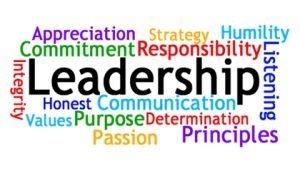
‘The action of leading a group of people or an organisation, or the ability to do this’
Leadership ……….beyond this definition people become leaders or move into leadership for many different reasons and circumstances but once they become a leader, to be successful in the role now requires a lot more of you, both personally and professionally, this is especially true today, when leadership is becoming even more challenging, with greater expectations, challenges and responsibilities.
When someone acquires the role of leader in any organisation, quite often in the early stages, they are working things out forthemselves, through trial and error, learning as they go, not only from others around them but also from the work they do, their own performance, as well as their own knowledge, skills and experience, it can be a case of finding out what works best, this takes time, energy and focus, the ability to adapt, learn and develop.
Agile Leadership
Over time, when things have settled down, a leader is able to build on their confidence and develop their style, one of the key differences for a leader to really develop and become more successful, is the ability to adapt and recognise that leadership is a journey and that they need to keep learning, developing and evolving. There is not necessarily only one way to lead but ultimately a leader develops a style and approach aligned with how they want to lead and be known and recognised by their peers, team and the organisation, but it is important to return again to one of the key factors – adaptability. A leader will need to recognise that the environment they work in is ever changing and that they will need to be aware of this and be ready to flex and adapt accordingly, using all available resources, including areas such technology, data and information, continuous improvement, their team , their own peer group, their trusted colleagues and advisors, their professional network, the market and industry sector they work in, current research and studies, the professional groups and bodies associated with their industry, sector or organisation.
Leadership Development
In addition a leader will have to sustain their own desire, motivation and sense of purpose by taking action and the necessary steps to help them grow and develop, this links well with the ability to adapt and flex, as a leader, personal and professional growth will enable them to perform at their best whilst ensuring they learn and develop their knowledge, skills and behaviours. The range of development depends on the individual, the environment and the organisation but there are some specific areas of development that remain consistently important:
In leadership, there some key skills and attributes to helping on the journey to be a successful leader:
Strategy
- To understand the strategy and direction required and then to set a vision and goals – for your teams, colleagues to follow and aspire to, aligned with the organisation and environment
- To put in place the necessary planning, objectives and actions to meet the vision and goals you set out
Self-awareness
- To be aware of your own drivers, values, knowledge, skills and behaviours
- To have social and self-awareness and the appropriate supporting skills (Emotional Intelligence)
- To know your personal stressors and triggers and how you recognise and manage your health and wellbeing (personal resilience)
- To recognise and work on your areas of personal and professional development
To Inspire and Motivate Others
- To understand how the teams, the individuals the people around you, working with you and for you, are all motivated by both similar and different factors
- To understand and work with these factors
- To be able to recognise and develop others based on their motivation and drivers, to be able to mentor, guide, direct, support and coach.
Effective Communication
- To be able to communicate effectively, internally and externally using interpersonal skills, presenting, chairing or facilitating discussion and meetings
- Written and verbal communication at all levels
- To understand, relate to and engage with others
Knowledge and Learning
- To have credibility in your field of leadership
- To have subject matter knowledge and awareness
- To build professional and supportive networks and connect with others in the same field
To Change and Lead Change
- To recognise and adapt to change
- To communicate change to others and lead change at every stage, learning, developing and adapting as required
The successful leader constantly evaluates and works on their on their key skills and attributes in order to perform and enable others to do the same.
I’ll leave you with just these questions to consider about your own leadership:
- What type of leader are you?
- What skills and attributes do you have as a leader?
- How do you ensure you are able adapt?
- What do you do to learn and develop in your role?

For more information contact
Graham Jeffery Coaching

Coaching for your personal & professional development
www.grahamjefferycoaching.co.uk
Please submit your comments below.
Do you have something to say about this or any other school management issue which you'd like to share? Then write for us!






